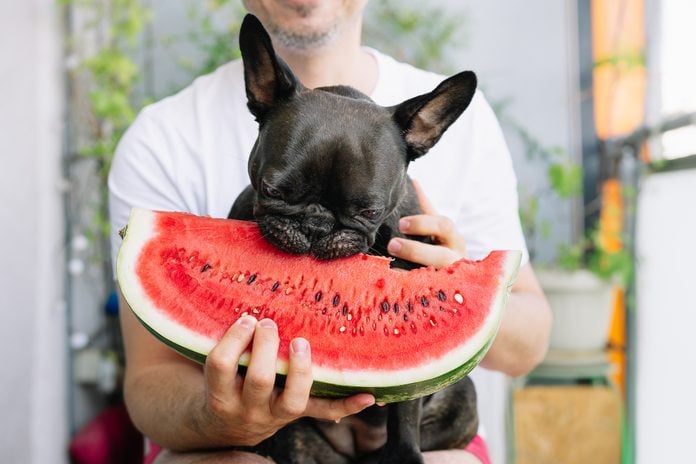
What human foods can dogs eat?
It’s no secret that dogs love food. They sometimes eat strange things (for instance, why do dogs eat dirt?), and they will happily scarf down human food. But most dog owners know there are plenty of human foods dogs can’t eat—not just because they can be unhealthy but because they can be toxic. And beyond that, dogs can have adverse reactions to certain foods, even if they are supposedly good for them. “It’s important to know that dogs can have food intolerances just like people, causing gastrointestinal upset or even an allergic reaction,” says Kelly Ryan, DVM, a veterinarian at Cityscape Vets on Excelsior in Minneapolis. So what human foods can dogs eat?
Before we dive into the dos and don’ts of sharing snacks with your furry friend, be sure to monitor your dog and check with your vet if you’re questioning whether to introduce a new food. Dr. Ryan also notes that human food that is not a specific part of your dog’s daily food regimen should not take up more than 10% of his caloric intake; that’s an important guideline when devising the very best diet for your dog. But if you want to feed your pup human food in a responsible way, you likely have questions. Can they eat eggs? Bananas? A nice chunk of steak? Here are the best options.
Get Reader’s Digest’s Read Up newsletter for more pet insights, humor, cleaning, travel, tech and fun facts all week long.
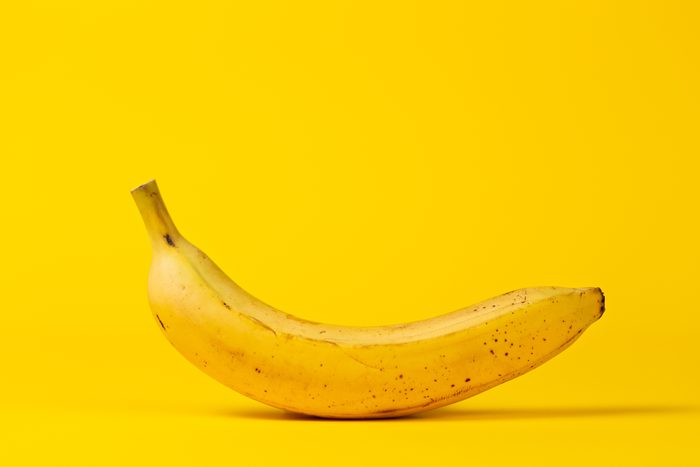
Fruits
A little fruit here and there is a sweet treat for your pup, and some fruits are actually beneficial to your dog’s diet. But moderation is the key, because most fruits are high in sugar, says Shawna Garner, DVM, U.S. lead veterinarian at FirstVet, an on-demand video consultation platform. “The best way to make sure that dogs get the nutrition they need is to feed them a nutritionally complete, commercial pet food as the basis of their diet,” says Dr. Garner. “Any other food should be given as a small treat or topping to their meals. Roughly a tablespoon of fruit or vegetables per day should be enough for a medium-size dog.”
That said, some caveats prevail. “Avoid giving fruits, with their high natural sugar content, to a diabetic dog,” says Lisa Weeth, DVM, head of the nutrition department at Metropolitan Animal Specialty Hospital in Los Angeles. “These foods can interfere with their blood sugar regulation.”
As long as your dog doesn’t have a specific medical issue or food allergy, these are some of the fruits dogs can eat.
Apples: Apples of all varieties make good treats for dogs, Dr. Garner says, because they’re an excellent source of vitamin C, fiber and calcium. “Make sure to cut them up and remove the core before serving,” she adds, “as apple seeds can cause dogs to have an upset stomach when eaten in large quantities.”
Bananas: Potassium-rich bananas are a safe treat for dogs, but they should be doled out in small portions due to their high sugar content. “They may cause your dog to gain weight if they eat too much,” notes Dr. Garner.
Blueberries: According to Dr. Garner, this antioxidant- and fiber-rich snack can help keep dogs in good shape. Blueberries are also among the possible cancer-fighting foods for dogs.
Cantaloupe: Yes, dogs can eat this delicious melon in moderation—but ditch the rind to avoid the risk of choking and obstruction.
Cranberries: It turns out that cranberries have some of the same benefits for dogs as they do for humans. “Cranberry supplements are thought to reduce the adhesion of bacteria in the urogenital tract and possibly prevent urinary tract infections,” says Stacy Choczynski Johnson, DVM, the vet expert at Pumpkin Pet Insurance. While some dogs may not like the sour taste, tossing your pup a couple of fresh or dried cranberries is fine from a safety perspective.
Oranges: Rich in fiber, vitamin C and potassium, oranges (along with tangerines, clementines and mandarins) are safe for pups to eat in moderation. PetMD notes that the peel and seeds should be removed before doggy consumption, though, to avoid an upset stomach or, in serious cases, an intestinal obstruction.
Pears: Pears get two paws up from pups! They’re another fruit packed with fiber and vitamins, making them both delicious and nutritious for dogs. Stick to fresh pears, though, as canned pears often contain too much sugar for canines.
Pineapple: Loaded with healthy nutrients and vitamins, pineapple is a fruit dogs can eat. It’s best to feed them raw pineapple in moderation and avoid the canned stuff.
Strawberries: Have your fur baby do some tricks for this sweet treat! Strawberries contain antioxidants, fiber and vitamins, making them a health-boosting snack for Fido.
Watermelon: Good news: Watermelon, a summer staple for many households, is good for your pup. “It is a health-food powerhouse, low in calories and packed with nutrients—vitamins A, B6 and C, and potassium,” according to the American Kennel Club. Watermelon is also a great snack to give your dog on a hot day, as it is mostly water. Pro tip: Freeze some watermelon cubes for an even better doggy cool-down.
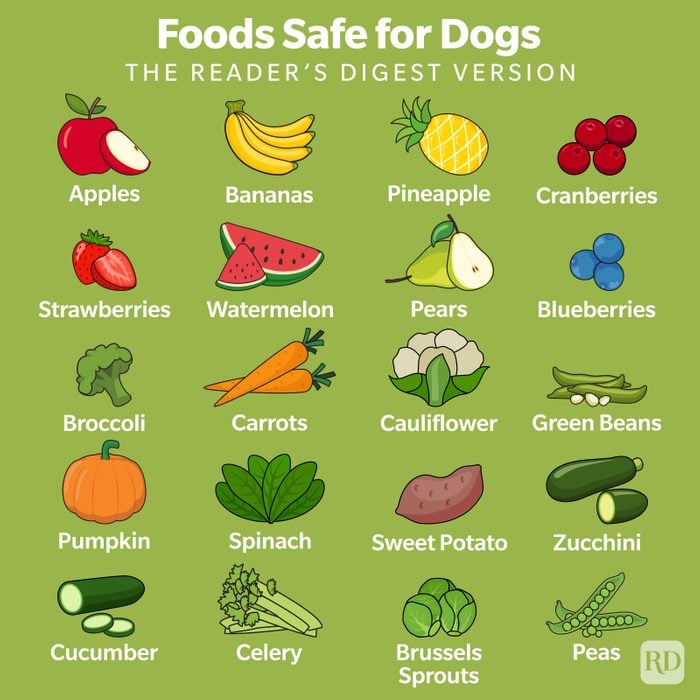
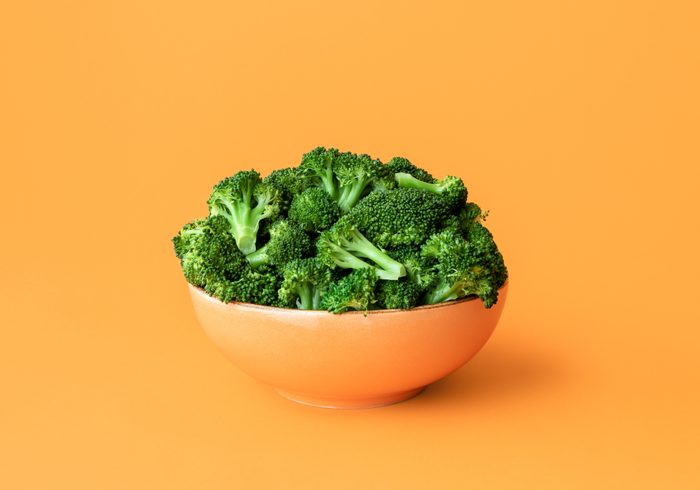
Vegetables
When asking yourself “What human foods can dogs eat?” a prominent food group to explore is vegetables. Most vegetables make a good treat for your pet, says Jamie Richardson, BVetMed, medical chief of staff at Small Door Veterinary in New York City. But if you’re giving table scraps, make sure the vegetables don’t include much in the way of butter, salt or other seasonings, she says. And just like fruit, when it comes to vegetables, a little bit goes a long way in your dog’s diet, so there’s no need to overdo it. One important note: With any raw or crunchy vegetables, be sure to cut them up into small, bite-sized pieces to avoid the risk of choking.
Here are some vegetables dogs can eat in small portions.
Asparagus: This vegetable has plenty of fiber, which can be good for a dog’s digestive health. As a snack, cooked asparagus is perfectly safe for dogs. But don’t give Fido the raw version: It can be difficult for him to digest.
Broccoli: Raw or steamed, bite-sized pieces of broccoli are a good source of vitamins A, C and K, as well as beta-carotene, folate and dietary fiber.
Brussels sprouts: Cooked Brussels sprouts are A-OK for your pup. Just make sure they’re not cooked with seasonings that could be toxic to Fido.
Carrots: Carrots are wonderful snacks for your pup. Dogs can eat carrots several ways: raw, cooked or even with the green tops still on them. But remember: They’re just a small part of your pet’s complete diet.
Cauliflower: Like broccoli, cruciferous cauliflower is full of vitamins and minerals, and it may help the aches and pains of older pets with arthritis.
Celery: Celery is a low-calorie, healthy snack for dogs. Chop some up and toss it in your pup’s food to add a nice crunch to mealtime.
Cucumber: Cucumber is another healthy snack option for pups. Slice ’em or dice ’em for your dog!
Green beans: Green beans are the full package: They’re a great source of fiber, omega-3 fatty acids, vitamins A, C and K, folic acid, magnesium, calcium, iron and potassium. In fact, green beans are so healthy for dogs that some people make them a sizable portion of their pup’s daily food regimen. Just don’t add salt or seasoning.
Peas: Fresh peas are rich in fiber and nutrients, making them a good occasional addition to your dog’s diet. Make sure not to season them, and avoid serving your dog canned peas, as they could have too much sodium.
Pumpkin: Vets often recommend pumpkin when a dog is constipated or has other digestive issues. Give your dog some canned pumpkin with his kibble to keep his digestive system running smoothly. Look for the organic kind, recommends Dr. Ryan, and “be sure it’s not pumpkin pie mix to avoid the spices. Also check with your veterinarian to see how much pumpkin he or she recommends, as too much can cause diarrhea.”
Spinach: Spinach is rich in antioxidants, iron and vitamin K. That’s what makes it so healthy for humans and a potentially beneficial part of your dog’s diet. Spinach can boost your dog’s immune system and energy levels, making for an all-around healthier pet.
Sweet potatoes: Another great source of dietary fiber, sweet potatoes are high in vitamin B6, vitamin C and beta-carotene. Sweet potatoes should be peeled and cooked—or you can pick up some dehydrated sweet potato dog chews.
Zucchini: “An excellent source of vitamin C, zucchini is also rich in beta-carotene and is a source of vitamin A, dietary fiber, potassium, folate and niacin,” says Dr. Chavez. Cook plain zucchini for your pup and put it in their dinner as a healthy additive.

Meat
Another good group that comes to mind when asking “What human foods can dogs eat?” is meat. But while your dog may love most kinds of meat, make sure whatever cut you give him is cooked and doesn’t have much fat on it. Food with a high fat content can easily make your dog gain weight. That said, here are some meaty options for Fido to indulge in.
Beef: Cooked lean beef is OK for dogs to eat. Serve it occasionally to add a nice punch of protein to your pup’s diet, and if you can, opt for grass-fed beef.
Chicken: As far as land animals go, chicken is always a safe bet, especially when your dog has an upset stomach. “Try bland foods like poached chicken and steamed white rice,” says Ann Hohenhaus, DVM, of New York City’s Animal Medical Center. “Veterinarians also recommend feeding cooked protein sources rather than raw protein sources,” she adds.
Eggs: Alright, we know eggs aren’t meat, but they are protein-packed, so we’re throwing them in the mix. Eggs are packed with minerals such as iron, phosphorus, selenium and zinc, and they’re OK to give dogs. Cook the eggs thoroughly and serve them to your dog plain; don’t add anything that could make them sick, like garlic and onions.
Steak: Thinking about tossing your dog a piece of steak? That’s fine, as long as the steak is cooked and free of any salt or seasonings that are toxic to pups. Just don’t feed your dog too much, as it could upset their stomach.
Turkey: Cooked turkey, without any seasoning, is OK to give dogs in small portions. Make sure to get rid of any bones, skin or fat before serving to Fido.
Here’s an answer to another doggy-diet question: Can dogs eat hot dogs?
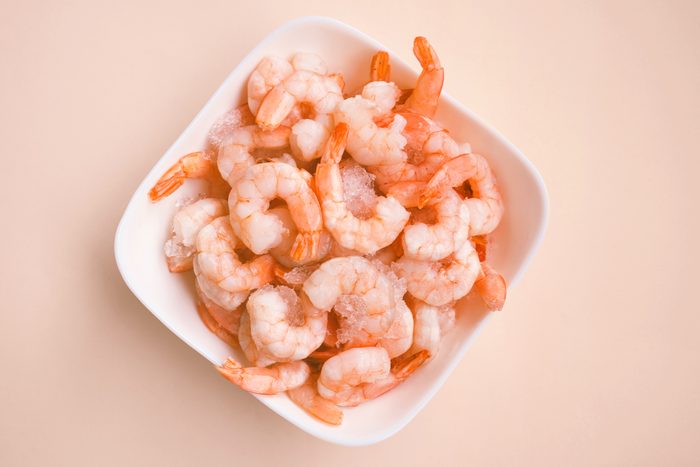
Seafood
Many people love seafood, but should you give your pup a nibble of these delicacies from the sea? If it’s raw, no—but if it’s cooked, that’s another story. Here’s what to know before giving your dog some surf n’ turf.
Fish: Fish is one human food dogs can eat—as long as it isn’t raw. And certain types of fish are healthier for your dog than others. Salmon, ocean whitefish and herring, for example, are fish that live short lives, so they have lower levels of mercury compared with fish near the top of the food chain like, say, swordfish. Fish is also a great source of protein for your dog if he or she has allergic reactions to other types of meat.
Shellfish: You can give your dog cooked, unseasoned shellfish like lobster, crab and shrimp in moderation. Shellfish have lots of omega-3 fatty acids and nutrients that are good for dogs, so when served properly, it can be a healthy (and luxurious) treat for your fur baby. Just be sure to remove any shells before tossing the shellfish to your pup.
Squid: Yep, dogs can eat squid as long as it’s cooked thoroughly and unseasoned. While plain cooked squid is OK to give dogs, don’t give your dog fried calamari; fried foods aren’t healthy for pups, and the breading could contain seasonings that are toxic to them.

Dairy
Dairy products are filled with protein, calcium and other essential nutrients for a balanced diet—and your dog can benefit from nibbling on the occasional dairy treat. A word of caution before feeding your dog dairy, though: Dogs can be lactose intolerant, meaning they can’t properly digest dairy products. So don’t go overboard with these treats at first. Instead, consult your vet and make sure it’s fine for your dog to snack on dairy. If you get the OK, observe your pup after they eat dairy. If they have an upset stomach, bloating or diarrhea, remove those dairy snacks from their diet.
Cheese: Yes, dogs can snack on cheese occasionally. Keep the cheese treats to a minimum, though, as cheese tends to be high in fat. Too much cheese could lead to your dog being overweight.
Cottage cheese: Cottage cheese is OK to give your dog in small portions once in a while. It’s also a good food to give your pup if they have an upset tummy.
Ice cream: Can dogs eat ice cream? The answer is technically yes, but it shouldn’t be given to your dog all the time. If you do want to give your pup ice cream, give them an option made specifically for dogs; many grocery stores and pet shops sell these ice cream options. If you do give your dog the real stuff once in a while, make sure it’s only given in small quantities and it’s free of any additives that could be toxic to them, like xylitol. Also avoid flavors that are toxic to pups, including chocolate and coffee.
Yogurt: Plain, low-fat or nonfat yogurt that doesn’t include any artificial sweeteners is typically OK to give dogs. Make sure the yogurt is as plain as can be and doesn’t include artificial fruit or chocolate.
About the experts
- Kelly Ryan, DVM, is a veterinarian at Cityscape Vets on Excelsior in Minneapolis. She earned a degree in veterinary medicine from the University of Minnesota and has held leadership positions at several animal facilities.
- Ann Hohenhaus, DVM, is a senior veterinarian and the Director of Pet Health Information at New York City’s Animal Medical Center. She’s an award-winning, third-generation vet who has contributed to several media outlets, including Ladies Home Journal and Real Simple.
- Shawna Garner, DVM, is the U.S. lead veterinarian at FirstVet, an on-demand video consultation platform. She graduated from the Ross University School of Veterinary Medicine in 2001, did general practice for two years and spent five years as an emergency room clinician.
- Lisa Weeth, DVM, is head of the nutrition department at Metropolitan Animal Specialty Hospital in Los Angeles. She has experience in general and emergency settings and is now dedicated to providing nutritional support to veterinarians and pet owners.
- Stacy Choczynski Johnson, DVM, is the resident vet expert at Pumpkin Pet Insurance. She has more than two decades of experience working with animals, from tiny kittens to big beluga whales.
- Jamie Richardson, BVetMed, is the medical chief of staff at Small Door Veterinary in New York City. She has more than 10 years of experience in veterinary medicine and earned a degree in Veterinary Medicine from London’s prestigious Royal Veterinary College.
Additional reporting by Kelly Kuehn.
Sources:
- American Kennel Club: “Can Dogs Eat Watermelon?”
- CesarsWay.com: “Dog Nutrition: A to Z”
- Purina: “Can Dogs Eat Carrots?”
- Rover.com: “What You Should Know About the Trendy Green Bean Diet for Dogs”
- Rover.com: “Can Dogs Eat Spinach?”
- American Kennel Club: “Can Dogs Eat Fish?”
- PetMD: “Can Dogs Eat Oranges?”
